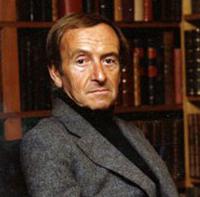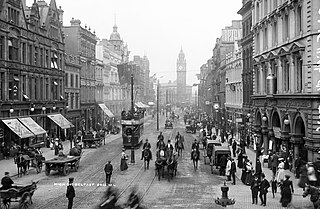
The Ulster Defence Association (UDA) is an Ulster loyalist paramilitary group in Northern Ireland. It was formed in September 1971 as an umbrella group for various loyalist groups and undertook an armed campaign of almost 24 years as one of the participants of the Troubles. Its declared goal was to defend Ulster Protestant loyalist areas and to combat Irish republicanism, particularly the Provisional Irish Republican Army (IRA). In the 1970s, uniformed UDA members openly patrolled these areas armed with batons and held large marches and rallies. Within the UDA was a group tasked with launching paramilitary attacks that used the cover name Ulster Freedom Fighters (UFF) so that the UDA would not be outlawed. The British government proscribed the UFF as a terrorist group in November 1973, but the UDA itself was not proscribed until August 1992.

Irish literature is literature written in the Irish, Latin, English and Scots languages on the island of Ireland. The earliest recorded Irish writing dates from back in the 7th century and was produced by monks writing in both Latin and Early Irish, including religious texts, poetry and mythological tales. There is a large surviving body of Irish mythological writing, including tales such as The Táin and Mad King Sweeny.

Brian Moore, was a novelist and screenwriter from Northern Ireland who emigrated to Canada and later lived in the United States. He was acclaimed for the descriptions in his novels of life in Northern Ireland during and after the Second World War, in particular his explorations of the inter-communal divisions of The Troubles, and has been described as "one of the few genuine masters of the contemporary novel". He was awarded the James Tait Black Memorial Prize in 1975 and the inaugural Sunday Express Book of the Year award in 1987, and he was shortlisted for the Booker Prize three times. Moore also wrote screenplays and several of his books were made into films.
The Ulster Protestant Volunteers was a loyalist and Reformed fundamentalist paramilitary group in Northern Ireland. They were active between 1966 and 1969 and closely linked to the Ulster Constitution Defence Committee (UCDC) and Ulster Volunteer Force (UVF), established by Ian Paisley and Noel Doherty in 1966.

The Ulster Workers' Council (UWC) strike was a general strike that took place in Northern Ireland between 15 May and 28 May 1974, during "the Troubles". The strike was called by unionists who were against the Sunningdale Agreement, which had been signed in December 1973. Specifically, the strikers opposed the sharing of political power with Irish nationalists, and the proposed role for the Republic of Ireland's government in running Northern Ireland.

Belfast is the capital of Northern Ireland, and throughout its modern history has been a major commercial and industrial centre. In the late 20th century manufacturing industries that had existed for several centuries declined, particularly shipbuilding. The city's history has occasionally seen conflict between different political factions who favour different political arrangements between Ireland and Great Britain. Since the Good Friday Agreement, the city has been relatively peaceful and major redevelopment has occurred, especially in the inner city and dock areas.
James Stewart Alexander Simmons (1933–2001) was a poet, literary critic and songwriter from Derry, Northern Ireland.

Operation Demetrius was a British Army operation in Northern Ireland on 9–10 August 1971, during the Troubles. It involved the mass arrest and internment of people suspected of being involved with the Irish Republican Army (IRA), which was waging an armed campaign for a united Ireland against the British state. It was proposed by the Unionist government of Northern Ireland and approved by the British Government. Armed soldiers launched dawn raids throughout Northern Ireland and arrested 342 in the initial sweep, sparking four days of violence in which 20 civilians, two IRA members and two British soldiers were killed. All of those arrested were Irish republicans and nationalists, the vast majority of them Catholics. Due to faulty and out-of-date intelligence, many were no longer involved in republican militancy or never had links with the IRA. Ulster loyalist paramilitaries were also carrying out acts of violence, which were mainly directed against Catholics and Irish nationalists, but no loyalists were included in the sweep.

Sandy Row is an inner city area of south Belfast, Northern Ireland, which is predominantly Protestant working-class. In 2018, the population was estimated to be around 4,000. It is a staunchly loyalist area and heartland of the paramilitary Ulster Defence Association (UDA) and Orange Order.
Maurice Henry Leitch MBE was a Northern Irish author. Leitch's work included novels, short stories, dramas, screenplays and radio and television documentaries. His first novel was The Liberty Lad, published in 1965. His second novel, Poor Lazarus was awarded the Guardian Fiction Prize in 1969, and Silver's City won the Whitbread Prize in 1981.
Events during the year 1994 in Northern Ireland.
Events during the year 1969 in Northern Ireland.
Sam McAughtry was an Irish / British writer, broadcaster and raconteur.

That part of the United Kingdom called Northern Ireland was created in 1922, with the partition of the island of Ireland. The majority of the population of Northern Ireland wanted to remain within the United Kingdom. Most of these were the Protestant descendants of settlers from Great Britain.

The following outline is provided as an overview of and topical guide to Northern Ireland.
Jack Holland was a journalist, novelist, and poet who built a reputation chronicling "The Troubles" in his native Northern Ireland. He published articles, short stories, four novels, and seven works of non-fiction, mostly dealing with the politics and cultural life of Northern Ireland. His last book, Misogyny: The World's Oldest Prejudice, was something of a departure from his usual writings, and its original publisher abandoned the finished manuscript shortly after Holland's death, which followed a brief struggle with cancer. However, the book was later published posthumously by a different publisher.

The Orange Volunteers (OV) was a loyalist vigilante group with a paramilitary structure active in Northern Ireland during the early 1970s. It took its name from the Orange Order, from which it drew the bulk of its membership.

The Hillcrest Bar bombing, also known as the "Saint Patrick's Day bombing", took place on 17 March 1976 in Dungannon, County Tyrone, Northern Ireland. The Ulster Volunteer Force (UVF), a loyalist paramilitary group, detonated a car bomb outside a pub crowded with people celebrating Saint Patrick's Day. Four Catholic civilians were killed by the blast—including two 13-year-old boys standing outside—and almost 50 people were injured, some severely.

The Kevin and Sadie series is a 1970s set of young adult novels by Scottish novelist Joan Lingard. The books, set in Northern Ireland and England against the backdrop of the Northern Ireland conflict, deal with a young couple; Sadie Jackson, who is from the Ulster Protestant community, and Kevin McCoy, who is from the Irish Catholic community. This couple finds love despite the various physical and psychological barriers in their society.
John Wilson Foster is an Irish literary critic and cultural historian.












